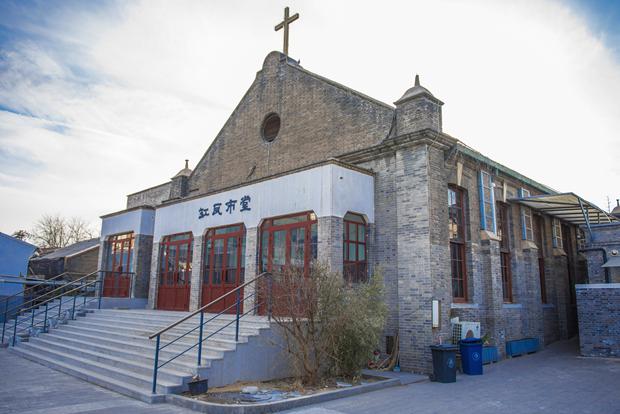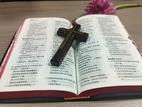I have been teaching English in China four years now. For the first several months, due to work hours, I was unable to attend church on Sundays except for during Spring Festival. However, since moving and starting a new job three years ago I have had Sunday mornings free and have been a regular at church again.
I have been to a few different churches now in China. I attend regularly in my current city and went to one in my previous city a few times when I had opportunity. I attended one service in Qingdao and I occasionally visit my Chinese in-laws’ church. While each of these churches is different from each other, I have noticed some similarities, and there are several differences from American churches.
First off, “That’s a church?”
The most important thing is to find a church, but that can be difficult if you don’t know what to look for. In China many churches are nestled into the mass of buildings, with nothing distinguishing them from the various storefronts except a large red cross. They are so easy to miss, in fact, that many Chinese friends, on hearing that I go to church, have responded with “I didn’t know there was a church here!” During my first several months here, in fact, I used to pass a church on my evening walks without even realizing it. I thought it was just another business, and only recently did I discover that it was a church.
I will say, though, that if you are visiting or living in a major city like Beijing or Qingdao it is relatively easy to find a church building. They may even be local landmarks, like the churches in Qingdao!
Second, “when does the service start?”
Although each of the churches I’ve been to is the same in this respect, I will use my regular church as an example.
Every week when my wife and I go to church there are people at the door handing out a sheet of paper listing the week’s activities and service times. However, the times are not exactly right from my foreigner perspective, because they mean something different by “service.” My wife and I usually arrive between 7:45-8:00. The service is listed as starting at 8:30. It’s an hour long service. Sounds good, right? Normal? Well, not exactly.
You see, the sermon starts at 8:30, and it ends sometime between 9:30-45. That’s just the sermon. The singing starts at 7:30. People arrive during the singing. Some people arrive just a few minutes before it ends, too. This is because what is meant by “service” is the sermon. In fact, anytime the church wants to refer to a special service with singing and sermons, such as an evening service to commemorate a holiday, it is called a “meeting” or “worship” in Chinese.
Third, “Who is preaching this week?”
One final difference is how the church is organized. I go to one of the three-self churches, and so occasionally the person giving the sermon is from the local TSPM, but that’s not what I mean. In Chinese churches there is usually more than one pastor, not to mention the preachers. And they aren’t the same thing. Oh, and they all preach.
What this means is that you never know from one week to the next who is going to be preaching. There are several possibilities. I don’t even know the difference between a pastor and a preacher in China. I think it has something to do with ordination or training. Or it has to do with level of responsibility. I’m not sure. All I know is that I wouldn’t understand a lick of what they’re saying if not for my wife.
Now this just scratches the surface of what you may find to be different when you visit a Chinese church for the first time. You may find things to be very foreign. That’s not a bad thing. One reason I’m here is to experience some things different from what I grew up with. It can be a little uncomfortable, sure, but it can also help us grow closer to a new people. We can get to know the Chinese a little through a shared faith in ways that different cultures would otherwise make difficult.
Most importantly is that no matter what the differences in worship styles, these are Christians. They love the same God I do. They believe the same things I do. We may not speak the same language, but they are part of the same family I am.
ABOUT AUTHOR: Zach Hubl is an English teacher in the northeast of China. He grew up in Texas, and worked part time with a local church outreach ministry while he was studying history in college. He now lives in Anshan with his wife, Grace, and their two cats.













